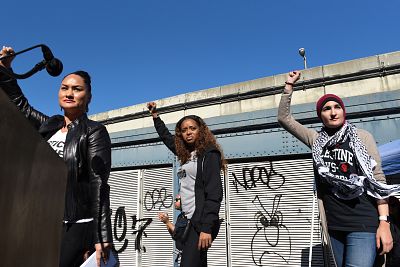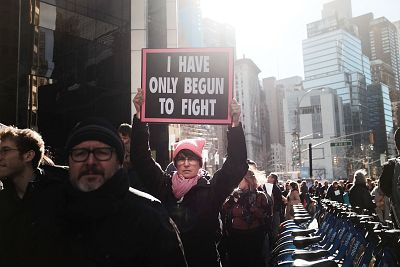"People that were working with us began to question working with the Women's March," one organizer said.
After thousands of Women's March demonstrators took over the streets of New Orleans two years in a row, Angela Adkins noticed a sharp drop in support for this year's march.
"We began to be contacted by women who were concerned about what was coming out of national," said Adkins, who chairs the New Orleans march and is president of the National Organization for Women's Baton Rouge chapter. "People that were working with us began to question working with the Women's March."
Claims of anti-Semitism against the leaders of Women's March Inc. have rocked the movement, with some local organizers looking to distance themselves from the group. Two of the leaders were accused of saying at a private organizing meeting that Jews bore a particular responsibility for the oppression of people of color, The New York Times andTablet magazine reported — claims both leaders have denied.
The controversy has amplified recent divisions within the Women's March over the group's inclusiveness, after millions turned out worldwide for the first demonstrations in January 2017, largely in response to the inauguration of President Donald Trump. Fallout from the dispute has had an impact on local women's marches across the country, which are grappling with how to respond.
Adkins said the New Orleans march, which is affiliated with the national organization, had a "terrible time" fundraising since mid-November, taking in just over $600 of the roughly $8,000 to $10,000 needed for permits, police escorts, port-a-potties, speaker systems and more. Only about 500 people said they planned to attend, down from thousands in previous years.
At the end of December, organizers canceled the Jan. 19 march.
New Orleans was not alone in that decision; a group in Eureka, California,scrapped its march over concerns that it would be "overwhelmingly white," and organizers in Chicago replaced their January march with an event in October before the midterms and a day of action planned for March.
Other local march organizations — including in Rhode Island and Washington state — have splintered from the national group, while some — including the Women's March Los Angeles Foundationand Women's March Florida — have made a point of noting on their websites that they are unaffiliated with Women's March Inc.
The recent rifts stand in marked contrast to the message of unity sent by the massive, defiant and exuberant rallies the day after Trump's inauguration, one of the largest demonstrations in U.S. history.
"The question that develops over time is: How do you maintain the mass participation and also, what are the next steps?" said Ellen Hartigan-O'Connor, professor of history at the University of California, Davis.
Even amid the apparent solidarity at the initial march in Washington, there were already tensions building beneath the surface. Ahead of the 2017 march, the national Women's March organization faced criticism that it primarily represented the interests of white women. In response, the organizers remade the leadership to include more women of color.
The anti-Semitism claims stem from a November 2016 meeting at which two Women's March leaders, Tamika Mallory and Carmen Perez, allegedly said that Jews needed to confront their own role in racism and that they "bore a special collective responsibility as exploiters of black and brown people," according to the Tablet. In response, Mallory and Perez have said that they condemn anti-Semitism.
The two were also accused of berating Vanessa Wruble, an early organizer of the Women's March who left the national group in 2017, in a way that targeted her for being Jewish, according to people who described the incident to The New York Times. Mallory and Perez denied disparaging Wruble's heritage, according to the newspaper.
These allegations came to light after Mallory was criticized for attending an event last year hosted by Louis Farrakhan, the Nation of Islam leader who has been denounced for making anti-Semitic and homophobic comments.
The Women's March has said in multiple statements that it does not support Farrakhan's comments and that it rejects anti-Semitism "in all its forms," but some critics have said its response did not come fast enough or was not strong enough.
Rachel O'Leary Carmona, chief operating officer of Women's March Inc., said the group has worked to be more sensitive and inclusive and "was learning how to do this work in a new way." The group has also scheduled training sessions on bias, including on anti-Semitism, she said.
"There's no map for what we're doing, and we're working it out," she said.
The Women's March group is planning its third annual march in Washington on Jan. 19 and said there are about 225 marches affiliated with the group planned across the country.
Another 160 events nationwide are being supported by March On, a separate organization founded by Wruble and other activists after her departure from Women's March Inc.
Wruble wants to people to know that the local marches are driven by hundreds of independent organizers and should not be associated with the national group's controversies.
"That narrative doesn't serve the movement," she said. "The women's march movement is as strong as ever," she added. "I am not worried at all that the controversy will dampen the spirit of the women's march movement or the work that we do."
Some local marches have taken pains to differentiate themselves from Women's March Inc. For example, Women's March Alliance, a group affiliated with March On that has organized marches in New York, announces on its website that it is not affiliated with Women's March Inc.
"There has been a lot of misplaced anger, when we have no coordination with Women's March Inc.," said Katherine Siemionko, founder and president of the group.
Amid the negative attention Women's March Inc. has received, some have called for the leaders to step aside. In November, Teresa Shook, one of the founders of the march, called for new leadership.
Thegroup responded by sayingthat she had weighed in "irresponsibly, as have other organizations attempting in this moment to take advantage of our growing pains to try and fracture our network."
There's a long history of instances in which race, class and other issues have led to the splintering of women's movements, Hartigan-O'Connor said.
One example is the racial divide in the women's suffrage movement, said Lisa Materson, a history professor at the University of California, Davis. At a 1913 march in Washington the day before President Woodrow Wilson was inaugurated, white Southern women objected to black women participating. Black women were told that if they joined, they would have to march at the back of the procession. Some black suffragists complied, but Ida B. Wells — a prominent black suffragist, journalist and anti-lynching activist — refused, joining the white women representing Illinois, her state, Materson said.
The march turned violent as anti-suffrage protesters confronted the women, but the demonstration was a turning point for the women's suffrage movement.
"Movements look different when you're in the middle of them than when you're looking back," Hartigan-O'Connor said. "There's a real tendency, for instance, to look at the civil rights movement and to see the power and the unity, but of course at the time there was plenty of splintering."
Materson said disagreements within women's movements "lead oftentimes to the elevation of important activist ideas, even if it's a painful experience for the people involved."
O'Leary Carmona, of the national Women's March group, said she hoped people would turn their focus to the work done by activists and successes such as the historic number of women elected to Congress in the midterms.
"There's enough work for all of us to do, and I think that the last two years have demonstrated our collective power and that our focus needs to remain on that," she said.
Adkins said her New Orleans group now planned to go on a listening tour throughout Louisiana before deciding if it would remain affiliated with Women's March Inc., as well as to discuss future marches and other actions.
"We're trying to support each other as best we can through this," she said.














